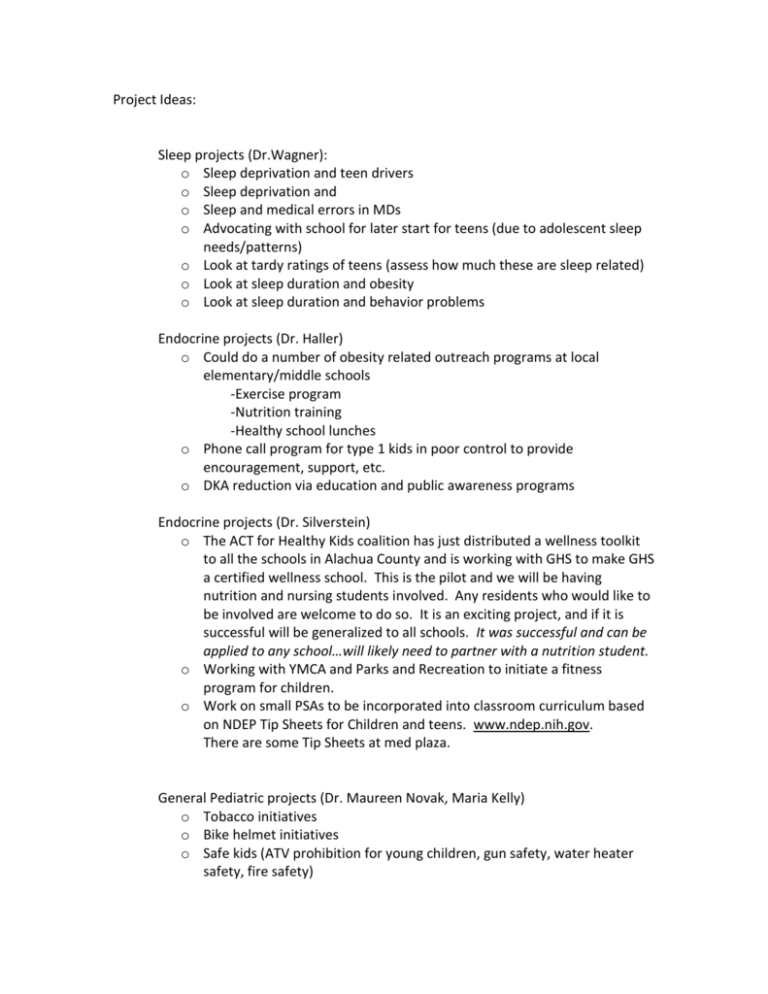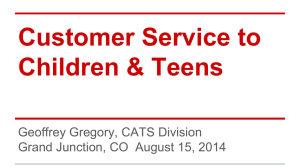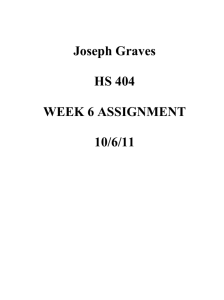Additional Project Ideas
advertisement

Project Ideas: Sleep projects (Dr.Wagner): o Sleep deprivation and teen drivers o Sleep deprivation and o Sleep and medical errors in MDs o Advocating with school for later start for teens (due to adolescent sleep needs/patterns) o Look at tardy ratings of teens (assess how much these are sleep related) o Look at sleep duration and obesity o Look at sleep duration and behavior problems Endocrine projects (Dr. Haller) o Could do a number of obesity related outreach programs at local elementary/middle schools -Exercise program -Nutrition training -Healthy school lunches o Phone call program for type 1 kids in poor control to provide encouragement, support, etc. o DKA reduction via education and public awareness programs Endocrine projects (Dr. Silverstein) o The ACT for Healthy Kids coalition has just distributed a wellness toolkit to all the schools in Alachua County and is working with GHS to make GHS a certified wellness school. This is the pilot and we will be having nutrition and nursing students involved. Any residents who would like to be involved are welcome to do so. It is an exciting project, and if it is successful will be generalized to all schools. It was successful and can be applied to any school…will likely need to partner with a nutrition student. o Working with YMCA and Parks and Recreation to initiate a fitness program for children. o Work on small PSAs to be incorporated into classroom curriculum based on NDEP Tip Sheets for Children and teens. www.ndep.nih.gov. There are some Tip Sheets at med plaza. General Pediatric projects (Dr. Maureen Novak, Maria Kelly) o Tobacco initiatives o Bike helmet initiatives o Safe kids (ATV prohibition for young children, gun safety, water heater safety, fire safety) o Counseling and psychological testing for children/families: reasons, resources and why. o How many of our clinic kids have hypertension, are we identifying it, are we doing something about it? General Pediatrics (Dr. Kelly) o Improved Newborn guidance for new moms o Improve tobacco education for medical students o Identifying hypercholesterol risk factors and screening o Improved asthma care in the outpatient setting o Transition of care General Pediatrics (Dr. Dumont-Driscoll) o new APA CORNET national research project on improving immunizations in adolescents cared for in continuity clinics o WCC health risk assessments and supervision guidelines General Pediatrics (Dr. Benton) o Motor Vehicle crash avoidance Sports Medicine (Dr. Backus) o Neuropsychological testing pre and post concussions (can join Dr. Backus in this project) Neurology projects (Dr. Edgard Andrade) o Medication compliance and chronic disorders o Medication errors and epilepsy o Risk of Sudden death ( also known as SUDEP) in poorly controlled epileptic patients Breastfeeding Initiatives/CPTI grant (Mary Ryngaert, Dr. Sullivan, Dr. Lossius) o Community Outreach: Participate in continuation of the Community Practice Training initiative work to provide community based breastfeeding promotion campaign to reduce pediatric obesity in vulnerable populations. Town Hall meetings/Girls Night Out events. Professional Lunch and Learn Events. Postpartum Luncheon for new parents in East Gainesville. You would interface with interns from the Public Relations Program in the College of Journalism. o Grant writing for breastfeeding promotion projects o Hospital based: Improve breastfeeding employee environment Access (Dr. Nackashi, Dr. Tuli, and ? Dr. Hardt) o Southwest community and patient education…(improving access thru interventions and education). There is a Southwest Advocacy Group. There is in relation to specific area of town considered high risk. Other (Susan Horky) o Tackling the cost of parking for families (particularly prohibitive for families making multiple trips here per week) o The video project I’m doing (based on training from Boston Children’s Hospital: www.videoproject.org ) in which we loan camcorders to teens with chronic illness, then use clips to educate healthcare professionals (clinical/education aspect) and transcribe and qualitatively analyze the data for themes (also do a quantitative pre-post analysis of quality of life and self efficacy). We could figure some angle for one or two of the residents to be involved. o The Archer Community Access Center (a grassroots center designed to provide afterschool tutoring and mentoring) is always looking for help and I’m sure could help a resident think of a longitudinal project. It is run by a lovely, dedicated couple who work very very hard to help the lives of the underserved in their community and is a good example of an authentic grassroots organization with little academic affiliation (though we’re trying to help that happen!) I believe they just received a grant to be a “Supplemental Educational Services” provider for the Florida Public Schools. o If anyone is interested in legislative advocacy, there will be a huge need in order to get CMS re-funded in coming years. To start… doing a handout that includes both quantitative information (number of kids going without services) and some “stories” to pull at legislator’s heart strings about the children who need coverage but are going without. Several exist already just in pulmonary (this turns out to be kids with some private coverage, but huge copays). Some of the problems will be mitigated by health insurance reform, but that will take time and some problems will continue. o The Health Department “Tobacco Free Alachua” coalition is going to have one or two primary areas of focus (determined at the state level). One of these will be targeting multiple-dwelling housing units. Mrs. Horky has all the contact info. o A family member on the advisory group who has a chronically ill child has an internal grant to conduct the “Ask me 3” campaign in the pulmonary clinic (this will probably bleed over to other clinics). This is essentially a marketing program that encourages families to ask three main questions at every visit (what is my problem, what should I do about it, why is it important—we may adapt these a bit for chronic illness). There are posters and buttons and the staff are all asked to encourage families to ask questions. We’re going to do a pre-post and would love resident involvement/assistance in this (it’s a two year grant, and the third year o Asthma: Anything to do with asthma! o (contacts…Susan Horky, Dr. Lossius, Dr. Catalanotto (DMD)) Dr. Hardt o Develop partnership with law students/MLPC (Medical Legal Partnership for Children http://www.mlpforchildren.org/ o Develop Advocacy “Code” card o Domestic Violence screening – Triple P o Primary prevention of adverse childhood experiences (ACEs), towards local policy change- See Dr. Hardt for more info. Other ideas: o The Colleges of Law and Medicine at UF have teamed up to help victims of domestic violence. They are screening in the OB clinic and will start screening at CMS and out at Tower Square in the fall. Here’s a link to an article in this month’s The Post that talks all about it (see page 8): http://media.news.health.ufl.edu/post/ThePost_MAY10.pdf contact Heidi Saliba for info o OBESITY (We all have ideas…Dr. Hardt, Dr. Dumont-Driscoll, Dr. Silverstein, MECHRDC) o Library Access Campaign to sign all Alachua county children up for library card. o Building Your Medical Home Toolkit www.pediatricmedhome.org Brought to you by the AAP/MCHB/National Center for Medical Home Implementation, the Building Your Medical Home Toolkit supports the primary care pediatrician's development and improvement of a pediatric Medical Home. It also prepares a pediatric office to apply for and potentially meet the National Committee for Quality Assurance (NCQA) Physician Practice Connections Patient Centered Medical Home (PPCPCMH) Recognition program requirements. The Toolkit can help a practice assess and improve its medical home capacity with resources and downloadable tools organized into six building blocks that provide guidance for implementation: o Private wells should be tested annually for contamination: A policy statement from the AAP, crafted with the U.S. National Institute of Environmental Health Sciences, recommends that families who use private wells for drinking water should test annually for possible contamination. The statement aims to protect vulnerable children from water-borne contaminants such as pesticides, fertilizers and sewage. o ImmuneWise http://www.aap.org/sections/ypn/r/advocacy o www.text4baby.org (Discuss project ideas and implementation with Dr. Erik Black) o Extensions of former projects (these are for reference…not all will be appropriate for continuation) o Dr Mckay – School based Influenza vaccination o Dr. Milloff – Young Adult Cancer Survivors in Transition o Dr. Kockler - Smoking Cessation Resources for Mothers of Newborns o Dr. Cheema – Online medical passports o Dr. Galligan – Web-based/DVD welcome/intro video o Dr. Griffin – Knowing your provider team- baseball cards o Dr. Ritchie – Radon awareness o Dr. Davis - Breastfeeding curriculum o Dr. Flores – Howard Bishop school (nutrition and exercise) o Dr. Ross – Developmental screening o Dr. Mageau – Oral health o Dr. Yee – Media exposure and influence o Dr. Thattaliyath – Teenage pregnancy and genetic influence o Dr. Shaik – Bike helmet initiative o Dr. Usher – Environmental health






